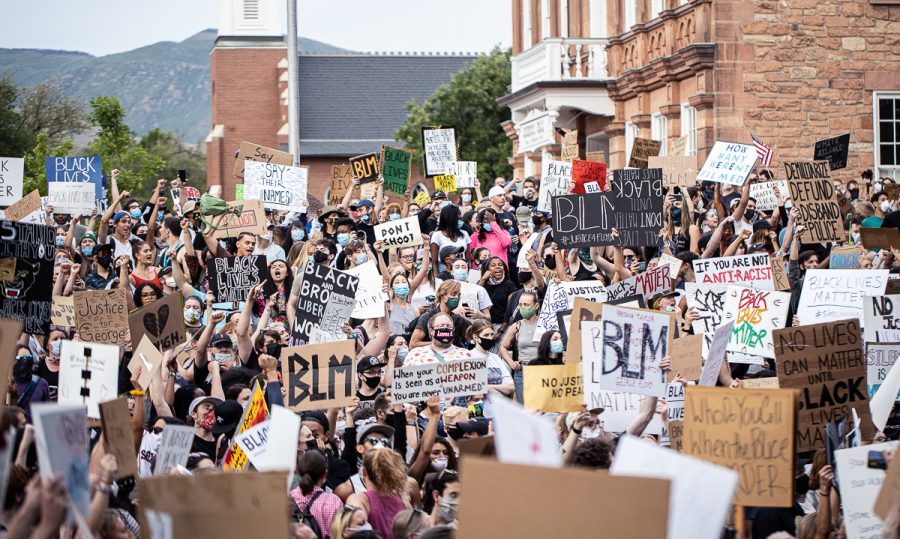Activism for Racial Equity Continues After a Summer of Protest
Protesters raise their signs in Salt Lake City, Utah on June 4, 2020. (Photo by Manasij Mukherjee | The Daily Utah Chronicle)
February 25, 2021
During the summer of 2020, the United States saw some of the most violent and powerful protests for racial equity since the Civil Rights Movement in response to the murder of George Floyd, and Salt Lake City was among the forefront. While the initial outrage and protest has died down, the activism of young Black leaders in the local community has not.
Salt Lake saw sustained protests from the end of May to the beginning of August with young leaders of many different social justice groups at the forefront.
MJ Powell was one of these young leaders. A student of political science at the University of Utah and Salt Lake Community College, Powell has been involved in racial advocacy for years. With deep roots in the African American community, as well as having connections with the SLCPD through being a part of the Police Explorers program, Powell has a perspective of understanding both sides of the fight.
Putting this perspective to use, he is on the mayor’s Racial Equity in Policing Commission, which is “organized to fundamentally examine the role of community policing and the role of the Salt Lake City Police Department in particular and how they are utilizing community resources in serving all areas of the community and for all groups.”
The commission implements and reforms policy-based decisions, meaning they examine the use of force, handcuff and restraint techniques, the use of canine dogs, and other controversial aspects of policing. The commission tries to reflect the community’s wishes, attempting to promote equity through intersectionality.
Powell explained an intersectional approach is essential to creating equity.
“Equity is making sure that subgroups are given the amount of resources to meet that one particular groups needs to make sure that they’re heard …, where equality is just the definition of being equal to,” he said.
The commission has held meetings through Zoom that allow any member of the community with any sort of views to call in and share their opinions and concerns, and they also hold weekly meetings every Wednesday that are open to public discourse and accessible through YouTube Live and Facebook. A calendar and updates on meetings are available on the commission’s website.
While not all of the objectives the commission has worked for have been met, they have defunded measures and began to create a zero-based budget for the department with outside contractors.
Daud Mumin is another young activist from Salt Lake City. At 19 years old, he is the youngest on the national board for March for Our Lives, an organization created to end gun violence across America, but he also has been involved with smaller groups like Black Lives Matter Utah and Justice for Bernardo, as well as supporting the movement to abolish the police.
He believes education is one of the most important aspects in the fight for equality, and “from this past summer we have the evidence that we have the people, that we have the ability to build momentum, and so now it’s about how to maintain that, and I think education is truly one of the first parts.”
He said the “everyday person” must become knowledgeable about topics of racial discrimination, and complacency and comfort are no longer an option for the majority white population of Salt Lake, even if it is no longer trendy and exciting to be involved in the movement.
“The truth is that mutual aid is not a sexy headline,” Mumin said, “instead, they [the media] want the largest protest since the Civil Rights Movement, so understand that activism is happening, and Black organizers haven’t stopped organizing, but they’ve stopped having the support of white institutions like the media, like the public.”
Despite this, Mumin still holds an unwavering faith in the future. In spite of a loss of interest by mainstream media, he believes there are people who will never give up on the fight for racial equality in America, though he said the country has a long way to go.
“We’re in a fight to create a role that has never existed, that we are quite literally dreaming of, so it’s our responsibility to believe that we will get there. But we can only get there if we’re kind to one another if we’re patient with one another if we make mistakes as a community and solve them as a community,” Mumin said.







